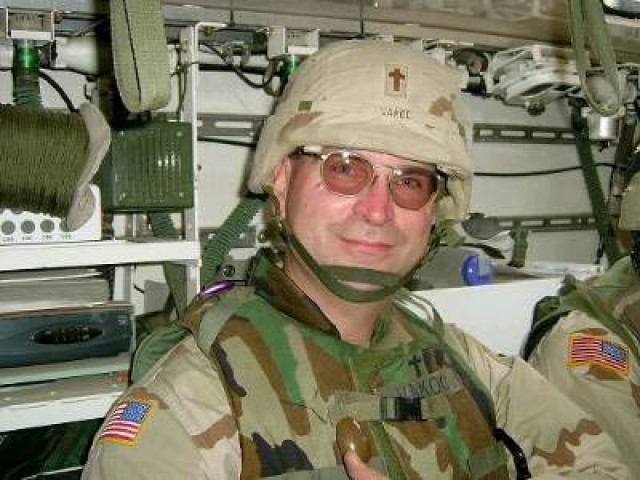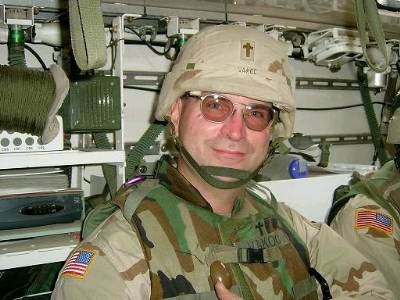WASHINGTON (Army News Service, July 2, 2009) -- Maj. Henry Timothy Vakoc, the Army's sole chaplain to have been severely wounded in Iraq, died June 20, from a fall at his care facility, five years after an improvised explosive device injured him on the drive back to camp from celebrating Sunday Mass for Soldiers in the field.
The IED attack occurred on the 12th anniversary of his ordination as a Roman Catholic priest, May 29, 2004, as he drove along the road returning to his unit, the 44th Corps Support Battalion in Mosul. It ended his all-encompassing work giving solace to the living, ministering to the wounded and honoring the dead.
The roadside explosion gravely wounded him, taking his left eye, paralyzing his left side and leaving him with a traumatic brain injury. He was evacuated to Germany and later to Walter Reed Army Medical Center here, and then to the Veterans Affairs Medical Center in Minneapolis, Minn., near his hometown of Robbindale where he continued to have countless surgeries and infections. He was later awarded a Purple Heart, the Bronze Star and the Combat Action Badge before being medically retired.
About 30 months later in 2006, the chaplain started to recognize his family and friends, able to acknowledge them with hand-squeezes and small smiles. Later he was able to type a few words through a laptop computer. He seemed to be winning the battle against the physical, starting to laugh and smile more, able to stand for 10 minutes at a time. His strength was building; he was able to use the machine that ran his CD player and television and he was able to give spiritual blessings with his right arm according to the National Catholic Register which kept updates on its Web site.
Father Tim, as he was known to his hometown parish and later to Soldiers, was recruited in 1996 by the Army Chaplain Corps and first served in Germany and later Bosnia.
Deputy Chief of Chaplains Brig. Gen. Donald L. Rutherford, who recruited Vakoc, recalled meeting the then-34-year-old priest who was young, very outgoing and friendly ... just what the Army was looking for to help fill the chaplain corps.
"When we went to Fort Snelling (Minn.) to do paperwork, fingerprinting, administrative things, everybody knew him from his parish," Rutherford said. "He knew most of them from visiting people in the VA hospital there. He was an amazing, unbelievable extrovert ... I don't know how else to put it ... he was just off the chart."
Rutherford attended the funeral for Vakoc, performing military honors at Fort Snelling where Vakoc was buried June 26. People from his hometown and who went to seminary with him were telling stories about him after the funeral, things that Tim had done for the parish and the mischief he got into as a kid. The wake was jam-packed for five straight hours, Rutherford said.
Rutherford and Vakoc served together in Germany. He recalled how Vakoc loved to participate in Volksmarches, the German version of fitness walking which is typically 6.2 miles of road or trail walking.
"He loved them. Every Thursday he would get Stars and Stripes and find out where the Volksmarches were, check it out on a map because this was before GPSs, then he would give me a call, so he would put his dog in the car and off we would go to wherever the Volksmarch was," said Rutherford. "He'd meet people along the way and even though his German wasn't good, he had a way of communicating with them all along the way."
Rutherford recalled a story about Vakoc from Iraq, how he would go anywhere regardless of where the Soldiers were.
"He went out to the same hospital where he was taken when he was wounded himself ... a convoy had been hit and two Soldiers had been killed, some were badly wounded and some were shaken up," Rutherford said. "Caring for the living, ministering to the wounded and honoring the dead, he did in 20 minutes that day. He took care of those who were alive and then he went over and talked to the guys who were shaken up and he ministered to the wounded and held prayers with the hospital staff."
Rutherford said someone once described Vakoc as the "most unpriestly priest and the most unsoldierly Soldier" he'd ever met as he ran around the compound in Mosul in his gator with his helmet on, but he was always where the Soldiers were. He'd even travel to the outposts and perform Mass for just two or three Soldiers.
"Tim had an amazing life of prayer. He was a very, very holy person, but he was holy in a way that was refreshing. He wasn't one who held his hands all together all the time, I wouldn't call him pious, but I'd call him a very spiritual individual and I think he relied a great deal on his faith and a great deal on those who were around him. When he was working with Soldiers, that's when he was at his best," Rutherford said.
In an email to the National Catholic Register before he was wounded, Vakoc summed up what he felt was his calling referring to it as a "ministry of intentional presence."
"I live with [the Soldiers], work with them, eat with them, care for them, listen to them, counsel them," he said. "The Soldiers know if you are real and genuinely care or not. The Soldiers see me out there with them and that makes a difference."


Social Sharing